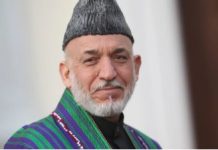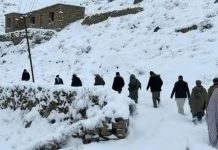KABUL, MAY 4: Afghanistan officials on Sunday expressed their concern that the ongoing tensions between Pakistan and India would have a “direct negative impact” on Kabul and the region.
After an attack on April 22 in occupied Kashmir’s Pahalgam killed 26 people, India, without investigation or evidence, implied “cross-border linkages” of the attackers. Pakistan has firmly rejected the claim and called for a neutral probe.
In response to India’s aggressive moves against the country, Pakistan had announced retaliatory measures that have included halting all border trade, closing its airspace and ports to Indian carriers and expelling Indian diplomats.
Addressing a press conference on Sunday, Hekmatullah Zaland, the deputy director of the Afghan foreign ministry’s Centre for Strategic Studies (CSS), said: “Since Pakistan and India are located in our neighbourhood, if this tension spreads, it will have a direct negative impact on the region and Afghanistan.”
The CSS deputy director added, “We are currently interacting with both countries in the light of our balanced policy.”
Zaland was speaking during a roundtable discussion at an academic conference titled “Tensions in Pakistan-India relations and their impact on the region”. The conference was organised by the CSS, according to a foreign ministry statement posted online.
During the discussion, officials pointed out the closure of the Attari-Wagah border, emphasising that the decision would affect Afghan traders.
On April 23, India had announced the closure of the Attari checkpost, alongside other measures. The next day, Pakistan responded by shutting the Wagah Border for any trade with India, including to or from a third country.
However, despite Pakistan allowing 150 stranded Afghan trucks carrying goods for India to cross the Wagah Border, India has not permitted them to cross into its territory, leaving truckers from Afghanistan in a mess.
According to the central leader of the Pak-Afghan Joint Chamber of Commerce and Industry (PAJCCI), Pakistan has also not permitted vehicles carrying items imported from India to enter Afghanistan.
Afghan traders said up to 2,000 containers carrying goods have arrived at Karachi ports from India under the transit agreement with Pakistan. But these vehicles are stranded in Pakistan, with some waiting at Torkham and Chaman to enter Afghanistan.
CSS Director Waliullah Shaheen discussed the historical background of the tense relations between Pakistan and India, stating that the two nuclear-armed countries would not enter into war and would find a solution to the problem.
Mufti Noor Ahmad Noor, the first political director of the Afghan foreign ministry, delivered a keynote speech at the roundtable discussions, the ministry said.
Discussing the factors behind the recent escalation of the conflict between Pakistan and India, he noted that the Pahalgam attack had exacerbated the long-standing tension. As a result, he added, both countries took measures, such as the closure of the Wagah-Attari border, that have affected the region, especially Afghanistan.
According to Noor, due to the border closures, Afghanistan’s commercial goods were practically stuck, causing significant damage to the Afghan trade sector. “Therefore, the Islamic Emirate [of Afghanistan] needs to prepare for potential incidents in advance,” the official stressed.
Noting that Afghanistan had “commonalities and positive interactions” with both Pakistan and India, Noor stated his country did not want a war between the two arch-rivals.
“Rather, in light of the Islamic Emirate’s balanced and economy-oriented policy, and because regional stability and security are important to the Islamic Emirate, we will strive to resolve this conflict peacefully,” he said.
Dr Hafiz Ikramuddin Kamil, another official, spoke about the legal aspect of India’s potential threat to disrupt flow of water after it suspended the 1960 Indus Waters Treaty.
Kamil observed that blocking the river for a long time seemed technically difficult and also had various legal aspects according to international law. “But for now, this issue has also emerged as a significant consequence of the tension in relations,” he added.
Dozens of foreign ministry employees participated in the discussion, where they shared their opinions and analyses on various aspects of the issue.
Dar chairs follow-up meeting on Kabul trip
Separately, Deputy Prime Minister Ishaq Dar presided over a high-level meeting at the Ministry of Foreign Affairs (Mofa) in Islamabad today to follow up on the outcomes of his recent visit to Kabul.
Dar’s visit to Afghanistan on April 19 marked the high point of a renewed re-engagement process between Islamabad and the Afghan Taliban administration after months of diplomatic deadlock, border clashes and mounting security concerns.
During his trip there, Afghanistan’s acting prime minister, Mullah Hasan Akhund, had assured Pakistan that the Afghan territory would not be used for hostile activities against any country.
In the meeting led by Dar today, officials from Mofa and relevant ministries were briefed on the progress in implementation of earlier decisions, according to the Foreign Office.
Dar, also the foreign minister, reaffirmed “Pakistan’s vision for a peaceful neighbourhood, enhanced trade and connectivity, sustainable development, and prosperity”.
The meeting was attended by Pakistan’s Special Representative to Afghanistan Mohammad Sadiq and senior officials from various ministries.

















